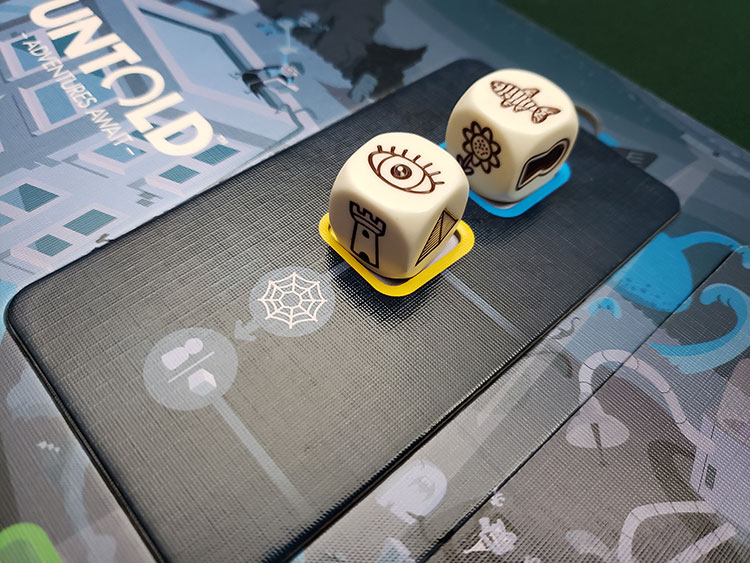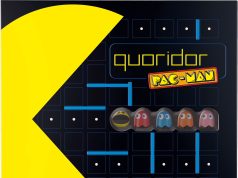 In case readers were not aware, there’s a regular debate in board gaming circles as to what actually constitutes a “game”. Ask one person and you’ll get one definition. Another person’s definition could be very different. One of the core things that is often cited, including by yours truly, is whether the engagement of rules includes a victory condition for one or more players. If so, it’s a game.
In case readers were not aware, there’s a regular debate in board gaming circles as to what actually constitutes a “game”. Ask one person and you’ll get one definition. Another person’s definition could be very different. One of the core things that is often cited, including by yours truly, is whether the engagement of rules includes a victory condition for one or more players. If so, it’s a game.
Skirting the lines here between game and non-game (also known as an “activity”) is a new production from publisher The Creativity Hub and Hub Games. The core of the game is a spin-off from a previous product known as Rory’s Story Cubes. They’re used to spark inspiration and drive stories amongst a group of “players”. And, in answer to the previous paragraph’s discussion, this product has no victory condition.
Untold: Adventures Await (Untold) is a new deluxified format of essentially the same activity for 1-4 players. Depending on how involved in the storytelling gets, this could take an hour or more. It’s also best to play with 3 players, but even 2 is fine with some story types.
Overview:
The action in Untold centers around three core elements. The first are a series of card sets which provide directional questions about the story being told. For example, the first card set is called “A Dangerous Dilemma”. This card set has a variety of questions that establish the central problem of the unfolding story.
However, before flipping this card, the players will need to define the setting and the characters of the story. This is an exceptionally free-form activity. Players should collectively agree on a time, place, and tone of setting. For the purpose of playtesting, our group chose a Horror-Pulp Steampunk story set in the Himalayas around the 1920s.

The second main component are the story cubes. The basic concept of the story cubes (dice) is that any random or invented element of the story should be derived from a die roll. Each of the dice has a different image on the sides so that they spark imagination much the same way a crude drawing or hieroglyph might. Players will at first use the dice results to enhance a basic concept of their characters in the story.
After setting and characters are ready, players start inhabiting the action by taking turns at storytelling. The cards for each scene which are flipped to direct the story action have inset spaces for dice. The player whose turn it is chooses one of the rolled dice and adds to the story based on the central question. For example, the flipped card may show icons for a villain’s action or a trait of the scene. Using the cubes, the player fills out the answers to those questions. In addition, other players can take tokens representing questions about the scene to drive more description. All of this is very free form and good natured with the rules stressing the cooperation and letting each player add their own voice.

The final component which adds another random element to the activity is the resolution cards. One deck of cards shows colors representing success or failure and another deck shows a range of emotions to drive character interaction or responses in the storytelling. Whenever a player’s character takes an action, players draw from these decks to see how it resolves. For example, in a roleplaying game, a character might attempt to climb a wall. In Untold, the same action is resolved with two card draws, one to see if the climb was successful, and another to see how observers or the character themselves react.
As players move through all five cards representing their plot, they will experience the shared storytelling much the same way a roleplaying game develops. The choices are not harshly driven by a huge ruleset and players have a high degree of freedom to express themselves. The resolution system also provides for the potential for stories centered around failure should the wrong resolution cards get drawn.

Product Experience:
As an activity with family (mixed, extended, or blended), Untold is top notch. As a writer, storyteller, and long-time roleplayer, this reviewer loves the directed nature of play and encouragement offered. In addition, the added components take what was a more bland activity (the basic use of Story Cubes) and turns it into something even writers can use to spark their imaginations for story ideas.

What’s more, the product also really helps new players feel at ease with roleplaying. The only restrictions really present are those to structure play, not to command it. The story told can take several directions and only depends on the imaginations of the players. In our session, the story was often helped a lot by the options on the dice, and it never felt awkward to be dependent on them.
If there is any negative to this activity, it’s a small outlier, but one which should be noted. Just as in other cooperative tasks, if one person has a greater command of the requested activity, they usually take the spotlight and become the alpha player at the table. Untold is no different. Alpha storytellers should find themselves biting their tongues a lot especially when ridiculous plot twists or non-dramatic segues enter the story. Much of the product keeps the plot on track, but there is always the possibility of derailment of a story to the chagrin of master storytellers.
Final Thoughts:
Untold: Adventures Await is an awesome experience. There’s a lot of fun to be had in the box but it demands a certain type of player. Those who enjoy the magic of storytelling and imagination will be rewarded. Those who prefer to read stories than to play them will not enjoy it. However, as a family activity, especially between young children and grandparents, it’s a great time.
The main reason the review ends here is that unlike most products reviewed by Board Game Quest, there isn’t a “game” in the traditional sense here. This is more of a roleplaying experience and shouldn’t necessarily be compared to games with a win condition.























There’s too much navel gazing these days. Just play.
by your “definition” where do roleplaying games like d&d fall? theres no victory condition, though pre-made adventure modules have endings, but the game doesnt end with them.
Truth be told, I look at roleplaying “games” as an activity, much like a group of friends getting together for some amateur acting. If people are playing roleplaying games to “win”, they’re going up against artificial and malleable constraints in the way I’ve seen roleplaying games most commonly played.